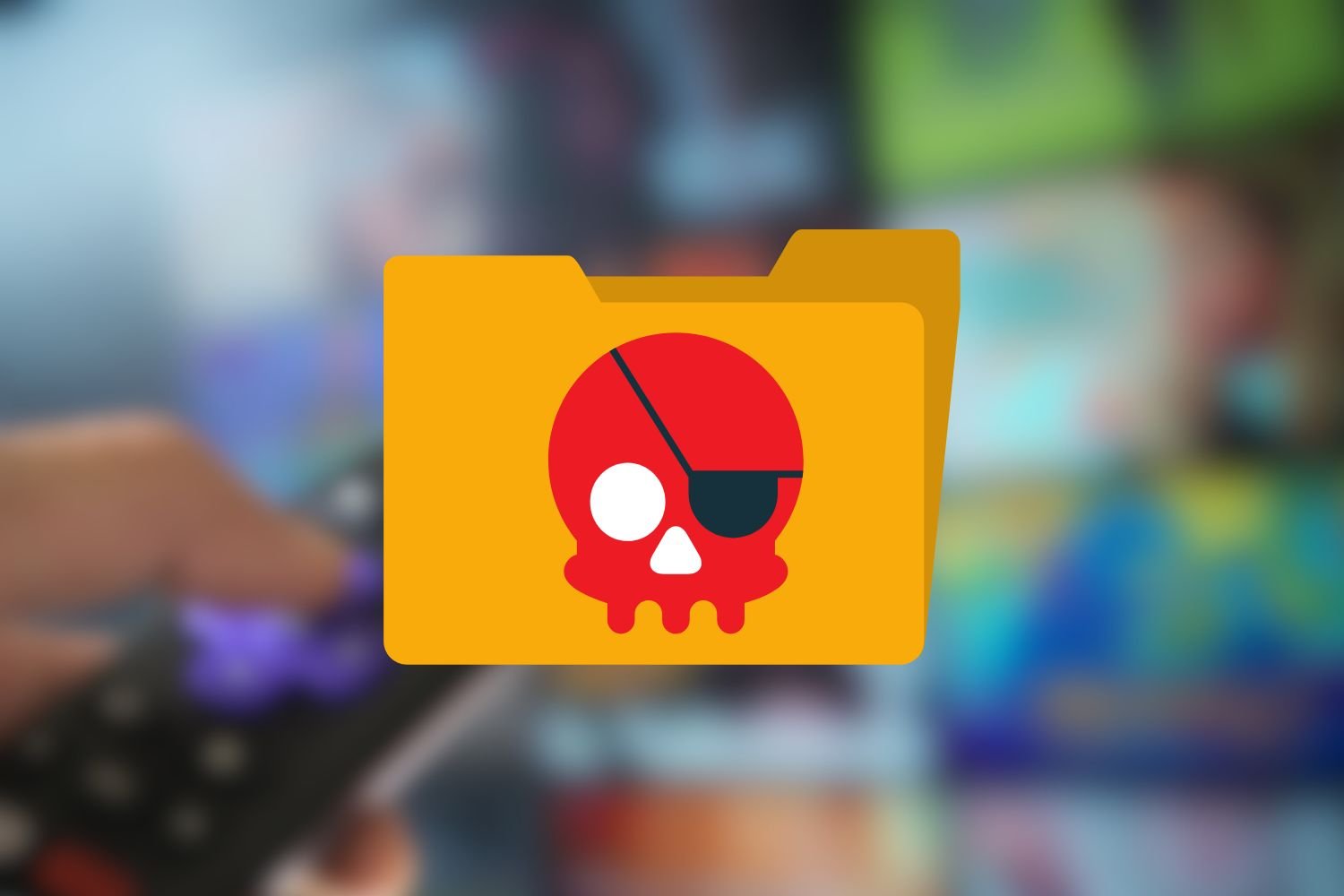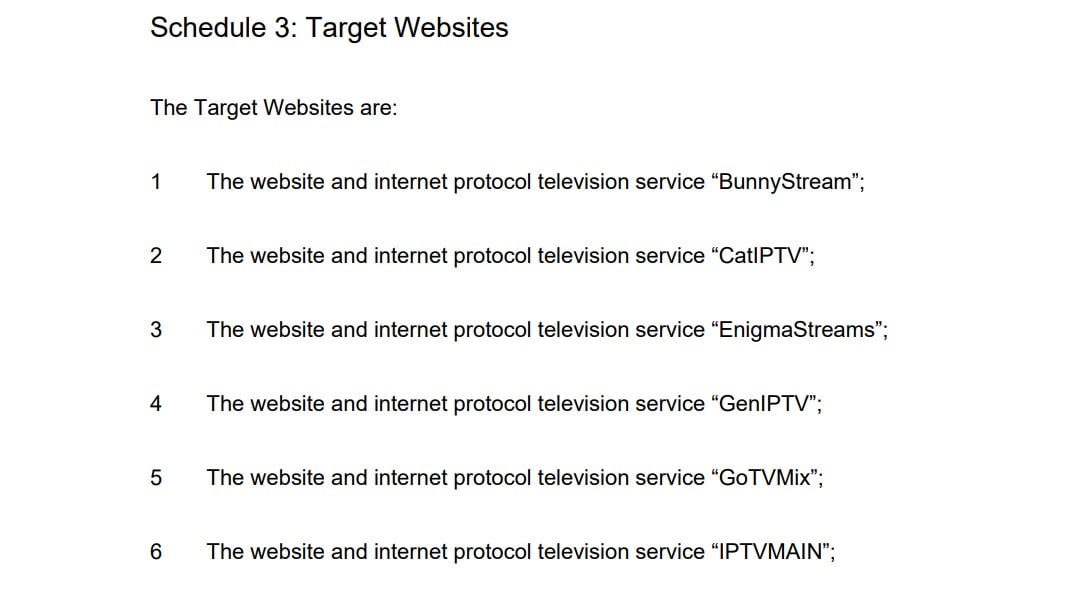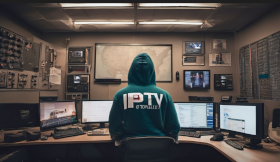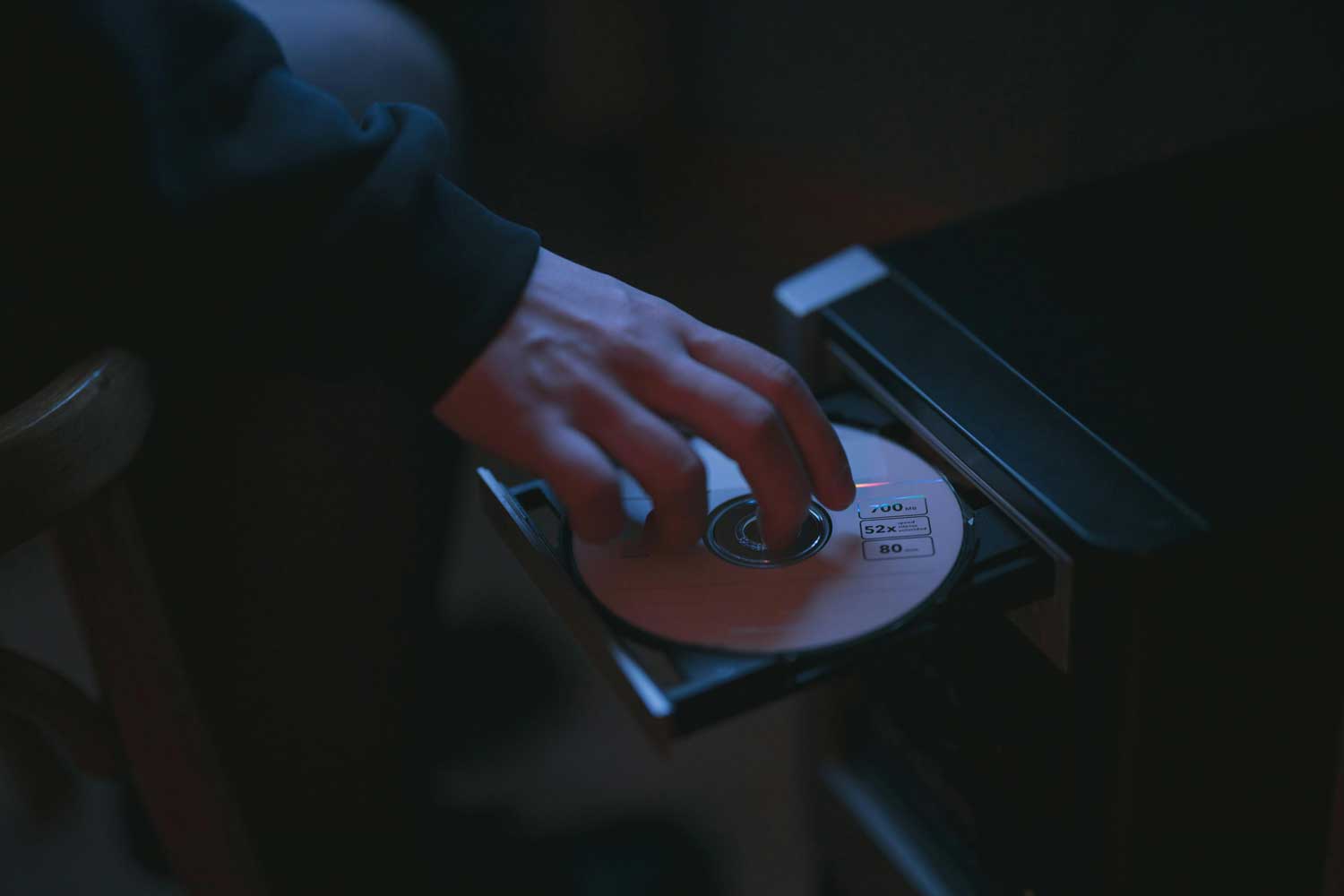-
 chevron_right
chevron_right
La Liga espagnole s’attaque aux sites de streaming illégaux en France
news.movim.eu / JournalDuGeek · 6 days ago - 08:09

 chevron_right
chevron_right
La Liga espagnole s’attaque aux sites de streaming illégaux en France
news.movim.eu / JournalDuGeek · 6 days ago - 08:09

 chevron_right
chevron_right
L’Arcom continue sa chasse aux IPTV pirates
news.movim.eu / JournalDuGeek · Friday, 3 May - 11:23

Google Removes Pirate IPTV Services From UK Search Results
news.movim.eu / TorrentFreak · Thursday, 2 May - 08:53 · 2 minutes
 The United Kingdom is no stranger to website blocking.
The United Kingdom is no stranger to website blocking.
The High Court granted permission for a blockade against Newzbin2 in 2011 ; The Pirate Bay and numerous other targets were blocked soon after.
A rough inventory carried out by TorrentFreak recently revealed that blocked domains, including subdomains, now exceed 10,000 separate targets. That’s a conservative estimate.
While people can still access pirate sites in the UK, it’s not as easy as it once was. The blocking efforts mainly make it harder for casual pirates to find content. To keep things this way, rightsholders have found an atypical ally in Google.
As covered previously, the search engine voluntarily removes pirate sites from its search results when rightsholders forward applicable site-blocking orders. As a result, domains such as ThePirateBay.org are no longer findable in the UK, France, and other countries .
Google’s compliance initially came as a surprise . After all, the tech giant previously opposed whole-site removals arguing that these would be counterproductive and jeopardize the free flow of information on the Internet.
Times have changed, however; Google has switched to a more cooperative policy which continues quietly today. New removal requests for torrent, download, and streaming piracy sites arrive regularly. Google has also removed thousands of YouTube-ripper domains after music group BPI alerted it to relevant court orders.
This week, we stumbled upon a new category to add to the list. After obtaining an IPTV-related blocking order last year, Sky asked Google to remove various domain names linked to IPTV providers.
In a recent notice, dated April 23 , Sky reports geniptv.net, iptvmain.store, iptvmain.tv and iptvmain.uk as infringing domains. These are all linked to IPTV services subject to a High Court injunction issued in 2023.

As far as we know, none of the mentioned domains host any content directly. Instead, these sites are used to sell IPTV subscriptions that provide access to unauthorized live broadcasts, including sports, plus on-demand films and series.
The IPTVmain.store website notes that this is all above board. “IPTV Main operates within legal boundaries, providing legitimate streaming services to our users,” its FAQ reads. However, Sky believes otherwise and the High Court agrees.
The High Court injunction allows for dynamic and time-sensitive IP address annd URL blocking. In addition, it requires local ISPs to implement static domain name blockades for the IPTV sites in question. Google followed suit, removing the infringing domains.
The latest notice isn’t the first of its kind. While thrawling through the Lumen database we spotted a few other notices where Sky urged the search engine to take action. These include other IPTVmain and GenIPTV domains, as well as CatIPTV, BunnyStream, EnigmaStreams and GoTVMix, all targets in the High Court injunction.

The effectiveness of these search engine removals is unknown, but it certainly won’t hurt Sky’s attempts to make IPTV services less accessible. Whether Google is open to follow-up actions, such as DNS blocking, or even more direct Chrome browser blocks, remains to be seen.
From: TF , for the latest news on copyright battles, piracy and more.
Pirate IPTV Owner’s Conviction First Ever Under Protecting Lawful Streaming Act
news.movim.eu / TorrentFreak · Wednesday, 1 May - 18:23 · 5 minutes
 Copyright law crafted decades ago to prevent infringement in an analog world has in many cases held up remarkably well in the digital age. Copying or reproduction remains relevant, as does the concept of distribution.
Copyright law crafted decades ago to prevent infringement in an analog world has in many cases held up remarkably well in the digital age. Copying or reproduction remains relevant, as does the concept of distribution.
In the United States, the existence of a loophole in copyright law had been an open secret for some time. One way or another, file-hosting and BitTorrent sites could be linked to the unlicensed reproduction and distribution of copyright works, both of which carry felony charges.
However, a newer breed of streaming sites were seen as engaging in unlicensed public performances of copyrighted works; a misdemeanor offense under a law that failed to anticipate streaming, let alone its meteoric rise to piracy dominance.
The Protecting Lawful Streaming Act ( PLSA ) closed the loophole late December 2020 with the creation of a new felony offense ( 18 U.S.C. § 2319C ) for those who, willfully and for commercial advantage or private financial gain, offer or provide to the public a digital service that illegally streams copyrighted material.
After taking so long to arrive, expectations were high. The return of “ billions of dollars in stolen revenue ” may have been optimistic, but after all the talk and calls for urgency, it was suddenly up for debate whether the PLSA would be used at all.
Keen to get on with the fight against piracy, Senators Patrick Leahy and Thom Tillis urged Attorney General Merrick Garland to make prosecutions under the PLSA a priority. But then, several months later in 2021, something caught our attention.
The instantly recognizable term “illicit digital transmission” had appeared in a criminal complaint for the first time. The case ultimately went in a different direction and the charge was shelved, but it was a sign of intent, if nothing else.
Seemingly out of nowhere, the PLSA claimed its first conviction this week. Landmark events like this are usually seen as an opportunity to celebrate the hard work of everyone involved, while sending a deterrent message to would-be pirates. But in this case, apparently not.
According to a grand jury indictment, from December 11, 2017, until September 7, 2021, Franklyn Valverde owned and operated an IPTV and VOD service marketed as ‘Fenix’.
In South Carolina and elsewhere, it’s claimed that Valverde knowingly and intentionally conspired to commit offenses against the United States, “to wit: the illicit digital transmission of services, in violation of Title 18, United States Code, Section 2319C.”
A prosecution under the PLSA shouldn’t be much different from any other but in this matter, an oddity raises its head right at the start. The indictment claims that Valverde’s streaming service operated by way of a “copyright infringing connection to DISH Network.”
DISH is extremely well-known for filing its own lawsuits because, at least on paper, most years they generate damages awards that can reach hundreds of millions of dollars. Why DISH suddenly found itself in the middle of a criminal case isn’t revealed in the indictment; what does seem clear is that others also had ‘copyright-infringing connections’ to DISH.
“M.D., a person known to the Grand Jury, owned, and operated ‘Cord Cutters’ and ‘Olympus TV,’ IPTV and VOD services that sold access to copyrighted movies and television programs by way of an unauthorized and copyright infringing connection to
Dish Network,” the indictment reads.
Subscribers to the Fenix service were able to access infringing content through various web-based applications for use on various platforms, including smart TVs, computers, set-top boxes, cellphones, and tablet devices.
According to the indictment, Valverde marketed Fenix and attracted subscribers through a network of resellers, each of whom sold monthly subscriptions via so-called reseller credits. One credit equals one month of access; profit is generated by buying credits at a discount and selling them on at a higher price to customers.
“Typically, [Valverde] sold access to Fenix streams of content to resellers using a unique access code. The reseller would then provide the code to the customers at an upcharge; Customers would then have access to the copyrighted materials for a specified period, typically one month.”
While the ‘publicly performed’ aspect clearly relates to the PLSA, all other aspects from reproduction to secondary infringement could’ve been handled under existing law. Nevertheless, the indictment covers other matters too.
In furtherance of the conspiracy, it’s alleged that Valverde committed the following acts:
1. Between 2017 and July 2021, Valverde sold reseller credits to ‘J.R.D’, a person known to the Grand Jury, for between $9 and $15 per credit. J.R.D resold the credits to customers for $25, enabling them to view the “publicly performed” works.
2. Between 2018 and May 2020, Valverde sold reseller credits to ‘M.D’, a person known to the Gran Jury, for between $7 and $15 per credit. M.D resold the credits to customers for $25, enabling them to view the “publicly performed” works.
“All in violation of Title 18, United States Code, Section 371,” the indictment adds. (18 U.S.C. § 371, Conspiracy to Defraud the United States)
In essence, count two in the indictment repeats the allegation that Valverde operated a digital transmission service, contrary to the PLSA.
Here, however, it’s alleged that on an unknown date, his Fenix service transmitted “one or more works being prepared for commercial public performance,” and where the defendant “knew or should have known that the work was being prepared for commercial public performance.”
Under the PLSA these violations can dramatically increase the maximum penalties available to the court.
The indictment doesn’t reveal which rightsholders’ content was infringed via the service, i.e which TV shows or movies were publicly performed. The other question involves the content allegedly obtained from DISH. If the content was obtained from DISH at the time it was broadcast to the public by DISH, as is usually the case, it raises the question of how it was still being prepared for broadcast. Court filings offer no explanation.
On June 9, 2023, at a district court in South Carolina, Valverde entered a plea of not guilty. He was subsequently given additional time to “review discovery, discuss the case, and negotiate further with the Government in an effort to resolve the case short of trial.”
With a full trial looming, a plea agreement dated November 23 reveals that Valverde had agreed to plead guilty to Count 2 of the indictment. This count covers the provision of the illicit digital service and the works being prepared for commercial public performance; as such the potential penalties are significantly increased.
In a judgment published Tuesday, District Judge Mary Geiger Lewis sentenced Valverde to twelve months and one day in federal prison followed by three years of supervised release.
The financial components of Valverde’s sentence include a $250,000 fine plus $22,639.27 in restitution. That amount is payable to NagraStar, the anti-piracy company partially owned by DISH that seems to have carried out the investigation against Valverde, in part at least.
The fates of ‘J.R.D’ and ‘M.D’ are unknown.
From: TF , for the latest news on copyright battles, piracy and more.
DISH Sued Two IPTV Resellers: First Case Dismissed, Second Owes $30m
news.movim.eu / TorrentFreak · Monday, 29 April - 19:47 · 4 minutes
 Last November, IPTV subscription resellers operating from channels4cheap.com (C4C) and purchase-iptv.com found themselves being sued by broadcaster DISH Network.
Last November, IPTV subscription resellers operating from channels4cheap.com (C4C) and purchase-iptv.com found themselves being sued by broadcaster DISH Network.
After what appears to have been a handful of trouble-free years of trading, the lawsuit named Texas residents John Gwaka Magembe and Joyce Berry as the alleged operators of the C4C website.
The decision to sell packages branded as Beast TV, a service that was taken down three years earlier by several Hollywood studios, Netflix, and Canada’s Bell Media, may have been a ploy to exploit existing brand awareness among pirates. The obvious downside was awareness among rightsholders.
“Defendants are trafficking in the Beast TV internet streaming television service a/k/a Channels4Cheap through their websites located at www.channels4cheap.com and its sister website www.purchase-iptv.com,” the company wrote in its complaint.
“Defendants sell Device Codes [subscriptions] to the Service on the C4C Website for $2 for a forty eight hour trial; $15 for one month; $40 for three months; $70 for six months; and $120 for twelve months, depending on the option selected by the user.”
And then came the body blow. DISH produced a screenshot to show that a person, also called John Magembe, was among the top 10 resellers of Beast TV subscriptions when the platform was in full swing.
In common with many other lawsuits of this type, this seemed destined for a predictable outcome. The final judgment would be months in the making so, in the interim, DISH took on another reseller.
In a complaint filed at a California court in February, DISH and Sling described Mr.Sharma of Sharma IPTV, and his company Astro Vastu Solutions (AVS), as traffickers of an illegal streaming service. Flyers distributed in the Bay Area advertising the service had led to DISH investigators handing over $135 for a subscription test purchase.
Payment for the alleged 10,000 channel service was made to Astro Vastu Solutions LLC. DISH and Sling alleged that this was to separate the name Sharma IPTV from transactions, with users asked to disguise their payments as something unrelated, such as an astrology consultation. Evidence presented in court reveals that the DISH test purchase was recorded as a “3 month warranty” ( pdf ) .
Other documents filed in the lawsuit reveal that a cease-and-desist notice sent to Sharma IPTV last September contained an offer to settle the case. DISH and NagraStar cited similar cases where failing to settle ended up costing a lot more, the $100m+ judgment against Nitro TV, for example.
With the $1m settlement offer attracting no interest, the companies ultimately sued for willful violations of 17 U.S.C. § 1201(a)(2) and 17 U.S.C. § 1201(b)(1) when the defendants manufactured, offered to the public, provided, or otherwise trafficked in their infringing IPTV service. DISH and Sling also demanded an injunction under 17 U.S.C. § 1203(b)(1) plus actual or statutory damages of up to $2,500 for each infringement under § 1201.
On February 20, 2024, DISH and Sling filed their motion for preliminary injunction but were unable to personally serve the defendants until early March, leading to a request to continue the hearing on May 30, 2024, around a month from now.
Then, seemingly out of the blue, a note appeared on the docket last week. It revealed that since the owner of Sharma IPTV was representing himself, he would appreciate some help from the clerk of the court “to process and serve documents to other parties.”
Exactly what that note means in the context of the lawsuit, which started with a rejected $1m settlement offer and escalated from there, isn’t made clear from the docket.
What is clear, however, is that the very next day DISH and Sling dismissed all of their claims in the lawsuit.
An accompanying note states that the notice of dismissal was served on the defendants at their last known addresses. Beyond that, there’s no additional information to explain why such a serious matter suddenly ended with no mention of a settlement.
For channels4cheap.com (C4C) and purchase-iptv.com operators John Gwaka Magembe and Joyce Berry, their fates diverged considerably, even from each other. It transpired that Berry is Magembe’s mother and the reason she appeared as a defendant in the lawsuit was her son’s unauthorized use of her bank account to receive payments for IPTV subscriptions. Berry was dismissed from the case, Magembe was left to face the music alone.
In a judgment handed down April 26, 2024, District Judge Mark T. Pittman noted that the plaintiffs had filed a well-pleaded complaint but the defendants’ failure to defend the claims against them had “brought the adversarial process to a halt, causing substantial prejudice to Plaintiffs.”
Based on this and other factors, a default judgment was warranted ( 1 , 2 ). On top of a broad injunction to restrain any similar conduct, Judge Pittman said that Magembe must pay damages totaling over $30 million in connection with the sale of at least 12,000 ‘device codes’ (subscriptions).
The conclusions of these cases couldn’t have been more different, despite being about broadly the same thing: reselling IPTV subscriptions to services operated by people other than the defendants in these cases.
Predictions sometimes miss the mark but for those who like a wager, it’s more than likely that new information will play a role when DISH moves on to its next targets. And the targets after those.
From: TF , for the latest news on copyright battles, piracy and more.
 chevron_right
chevron_right
IPTV et piratage : les internautes dévoilent les vraies raisons de leur choix
news.movim.eu / JournalDuGeek · Thursday, 25 April - 15:24

Vietnam Admits Manga Piracy Problem as New BestBuyIPTV Details Emerge
news.movim.eu / TorrentFreak · Wednesday, 24 April - 19:09 · 4 minutes
 The joint press release issued Monday by the Premier League and Alliance for Creativity and Entertainment (ACE) was unusual right from the start.
The joint press release issued Monday by the Premier League and Alliance for Creativity and Entertainment (ACE) was unusual right from the start.
Published early on Monday, even the timing was a break from the norm, but the content was even more surprising. Following criminal referrals by the Premier League and ACE, an operator of BestBuyIPTV – a platform that has appeared on the USTR’s Notorious Markets report for the past five years – had been convicted at the People’s Court of Hanoi.
For a country where criminal referrals have traditionally disappeared into the ether, that could be a very big deal.
The press release clearly identifies Le Hai Nam as “the operator” of BestBuyIPTV. He entered a guilty plea and was sentenced to 30 months in prison and ordered to pay the equivalent of $4,000. Whether that was a straightforward fine or something else isn’t clear, but more than $24,000 in illegal profits were identified, confiscated, and then seized by the state, while $12,000 in restitution was paid according to the indictment.
Having learned more about the case and its challenges since Monday, the conviction seems to represent a minor miracle in itself. In isolation, however, there’s an irreconcilable gap between the scale of the infringing and the punishment handed down.
For reasons that aren’t addressed, the court suspended the entire sentence, i.e no prison time at all. Assuming the restitution was split 50/50, that’s $6,000 each for the Premier League and ACE, while $24,000 – the bulk of funds – simply evaporated into the public purse. It’s a baffling situation, but clearly the conviction is the main prize here; it could be priceless.
Information made available to TorrentFreak suggests that the Premier League filed a complaint with authorities in June or July 2020, requesting an investigation and criminal prosecution of not one, but two Vietnamese nationals, one of which was Le Hai Nam.
The other, whose name we’ll refrain from revealing here, was considered the operator of BestBuyIPTV while Nam appears to have controlled the restreaming side of the business. Communications with customers show involvement in both reselling and direct sales, however.
Estimates of how much BestBuyIPTV was making overall were not made available to us, but a third party estimate provides some basis to throw some figures into the air to compare with the $14,000 paid in restitution.
In common with similar services who use subscriber numbers as part of their marketing, BestBuyIPTV’s homepage boasted 900,000 subscribers, between 10,000 and 12,000 resellers, and around 2,000 restreaming affiliates. If we assume these figures are highly inflated and then broadly avoid counting revenues twice, a conservative estimate would run to a seven-figure sum, and quite possibly eight.
The other remarkable aspect to this case can be viewed from two different directions. Either there was a complete lack of awareness on the security front, or maybe none of those involved actually cared. Given the technical skills on display concerning the service itself, the former seems to be out of the question. That leaves the latter, and probably one of the easier identifications for the Premier League in recent years.
Of course, that’s just a small part of the puzzle; gathering evidence to support convictions is painstaking work and more may be needed to bring this particular battle to an end.
As regularly reported over the past few years, Vietnam is home to some of the world’s largest pirate sites. In the United States, with site-blocking legislation back on the political agenda, the spotlight is on FMovies , one of the world’s leading movie and TV show streaming sites.
For some time, however, copyright holders in Japan have been reporting several other Vietnam-based or Vietnam-operated platforms responsible for staggering levels of piracy. They specialize in Japanese comics, known as manga, and local cartoons, better known as anime.
After recently renewing an anti-piracy partnership with Hollywood, publishers and anti-piracy group CODA are independently working flat out to solve what at times has looked like an unsolvable problem. However, unusual comments published in local media may suggest some light on the horizon.
Pham Hoang Hai is the director of the Radio, Television and Electronic Information Testing Center, which operates within the Department of Broadcasting and Electronic Information under the Ministry of Information and Communications.
In comments published recently in local media, Hai said that around 100 websites are known to offer football matches illegally in Vietnam, together responsible for around 1.5 billion views in the 2022/2023 season. He also commented on sites dealing in other content, around 200 generating around 120 million views. And then something else, which as far as we know is the first public comment that acknowledges the scale of manga piracy traceable to Vietnam.
“Recently, we discovered a number of websites with servers located abroad that violate comic book copyrights,” Hai said .
“There have been a number of Japanese organizations working with the Ministry of Information and Communications, reporting comic book violations. Wars in cyberspace have caused hundreds of millions of dollars in damage to copyright owners.”
In isolation, that may not sound like a particularly important comment and with no context, a suspended sentence and measly restitution could easily be dismissed on the same grounds. Only time will tell whether these seeds will grow into something more substantial but in Vietnam, where signs of progress are extremely rare, any achievement in the right direction holds significant value.
From: TF , for the latest news on copyright battles, piracy and more.
‘BestBuyIPTV’ Operator Sentenced in Vietnam’s First Ever Online Piracy Conviction
news.movim.eu / TorrentFreak · Monday, 22 April - 14:24 · 2 minutes
 In recent years, copyright holders have paid close attention to a growing number of large piracy services with connections to Vietnam.
In recent years, copyright holders have paid close attention to a growing number of large piracy services with connections to Vietnam.
Popular brands including Fmovies, AniWave, 123movies, BestBuyIPTV, 2embed, and Y2mate are all linked to the Asian country, which was recently branded a ‘piracy haven’ .
To curb this trend, western rightsholders have been working with local authorities to bring local investigations and enforcement efforts up to par. While this process takes time, there was a breakthrough last week.
The People’s Court of Hanoi handed BestBuyIPTV operator Le Hai Nam a 30-month suspended prison sentence. In addition, the man must pay the equivalent of $4,000 in local currency, after having paid $12,000 in restitution previously.
BestBuyIPTV is known as one of the most popular IPTV services. The subscription platform has been repeatedly called out as a notorious piracy market by the US Trade Representative, as recently as this year.

The defendant reportedly pleaded guilty to his role in the BestBuyIPTV operation. While a copy of the verdict is not immediately available, a release shared by rightsholders attributed the following quote to the Hanoi court Judge.
“The defendant has violated the provisions of the law which protect the copyright and related rights of the Motion Picture Association’s members and the English Premier League,” Judge Le Hai Yen said.
According to the Judge, these types of crimes are a danger to society and should be strictly enforced and prosecuted, to send a deterrent to other operators of pirate sites and services.
The prosecution follows referrals from the Premier League and Alliance for Creativity and Entertainment ( ACE ), who note that this is the first-ever online piracy conviction in Vietnam.
The rightsholders see last week’s conviction as an important milestone that will set a precedent in Vietnam. It’s a clear signal that online pirate sites and services won’t be tolerated, they say.
“This result should serve as a stark warning to anyone involved in the illegal supply of Premier League streams in Vietnam. It is the result of a strong partnership between the Vietnamese authorities and local law enforcement, ACE and the Premier League,” says Kevin Plumb, Premier League’s General Counsel.
Karyn Temple, MPA’s Senior Executive Vice President, shares this view and hopes that the Vietnamese authorities will move onto other high profile targets next, which could include the popular streaming site Fmovies .
“We eagerly await similar action from Vietnamese law enforcement on other longstanding priority targets engaged in digital piracy on a global scale,” Temple notes, without explicitly naming any.
Interestingly, the BestBuyIPTV threat may not be completely dealt with yet. MPA previously called out the ‘Bestbuyiptv.biz’ domain in relation to the popular service, which remains online today.
“BestBuyIPTV is extremely popular in the United States & Europe,” MPA wrote at the time, adding that “the operators are located in Vietnam.”

It’s possible that other operators of the service managed the service online, which would put the conviction’s deterrent effect in doubt. Or was the sentenced operator perhaps linked to another BestBuyIPTV service?
We have asked the MPA for clarification, as its press release makes no mention of this, and will update the article when an official response comes in.
From: TF , for the latest news on copyright battles, piracy and more.
‘Smart IPTV’ App Blocked By ISPs, Despite it Carrying Zero Illegal Streams
news.movim.eu / TorrentFreak · Saturday, 20 April - 08:28 · 6 minutes
 In a world where users can have their own ChatGPT-like AI instances up and running on their own PCs, in just a handful of minutes, for zero spend and completely legally, the app experience on smart TVs rarely fails to disappoint.
In a world where users can have their own ChatGPT-like AI instances up and running on their own PCs, in just a handful of minutes, for zero spend and completely legally, the app experience on smart TVs rarely fails to disappoint.
Yet when smart TV users somehow manage to clunk their way through, say, LG’s menus, and then avoid the avalanche of distractions that exist purely to break their will, only disappointment lies ahead for the IPTV-curious.
If, against all odds, they find an app that resembles the thing they actually searched for, the high probability of being presented with the app “Smart IPTV” is something thousands before them will attest to.
It’s not that Smart IPTV is a poor product, it’s not. The fact that most of the time people have to pay to use it isn’t to blame either. The problem is the expectations of those who bought the software in the belief it contains illegal streams. It doesn’t, and that can be very disappointing.
Most likely due to the number of complaints from misinformed buyers, listings for the app on the LG, Samsung, and Google Play stores are now very clear: Smart IPTV does not provide access to playlists or streams, so don’t even ask.
The reason for the confusion among prospective buyers isn’t immediately clear. Smart IPTV seems like it’s been around forever and at no point has anything stuck out as being especially misleading or offering any suggestion that more might be on offer.
Yet now, even those who purchased Smart IPTV in full knowledge it offered no content, are being disappointed too.
During the past few days, reports have surfaced indicating that the official website of Smart IPTV has been blocked by Spanish ISPs. Visitors to siptv.app are instead redirected to an alternative page displaying the following text:
“Contenido bloqueado por requerimiento de la Autoridad Competente, comunicado a esta Operadora”
When translated to English, the message reads: “Content blocked at the request of the Competent Authority, communicated to this Operator.
In common with many countries around the world, particularly in Europe, Spain has a site-blocking system that restricts access to sites and services deemed to infringe copyright. Some prominent cases receive publicity as they travel through the legal system, most notably when top tier football league LaLiga and its broadcasting partners obtain injunctions to block pirate IPTV services.
While Spain does put together a report every few months to show the extent of blocking in the country, its usefulness is limited to a review of blocking already in place. As a tool to explain what is happening now, much less why a site or service was deemed infringing, the report is effectively useless.
As a result, which company declared the Smart IPTV app as copyright-infringing is unknown. What we can do, if only as a thought exercise, is use existing information to establish the most likely candidate based on motivation and past statements.
When it comes to blocking measures, especially those related to pirate IPTV, no rightsholders anywhere in the world are more aggressive than those behind the most popular football leagues.
The Premier League (England), Serie A (Italy) and LaLiga (Spain) are widely considered to be the leading proponents of blocking measures. Through a basic process of elimination, LaLiga is the only entity from the three likely to have targeted Smart IPTV in Spain, but there are more compelling reasons than simply being an aggressive blocking proponent in a specific geographic area.
In a 2022 submission to a then-upcoming edition of the European Commission’s Counterfeiting and Piracy Watchlist, LaLiga submitted a list of apps that, from a technical perspective, could play illegal streams of LaLiga football matches.
More accurately, the majority simply allowed the users of the apps to play content referenced in .M3U playlists that were not supplied with the apps themselves .
Being able to play an .M3U playlist is a basic functionality offered by media players including VLC. For those sporting gray hair today, the same ‘technology’ was available in Winamp. Those who remember .M3U playlists starting to gain popularity in 1996 will be able to explain this incredible technology in a few words; it’s a text file containing locations where information can be found, on a hard drive (c:\playlists) or a network, mostly using a domain or IP address.
Instead of accusing the apps of infringement directly, LaLiga used broad strokes to paint a picture of infringing capability.
“It is important to note that all of these player applications allow the consumption of an innumerable amount of audiovisual contents such as sports, movies, series TV channels, etc. In other words, this problem affects the entire audiovisual and entertainment industry in general,” LaLiga added, carefully choosing its words.
As we highlighted at the time, LaLiga’s careful words were supported by carefully presented evidence, which in one case took an IPTV developer’s documentation and used it against them, after cropping the screenshot to disappear a line that began: “This app doesn’t contain any built-in channels…”
Again, we must reiterate that Spain’s blocking mechanism fails to offer enough transparency to identify who is behind the blocking of Smart IPTV. This means that we cannot say with any certainty that LaLiga is actually behind the blockade, but we can offer a generalized conclusion.
Any system that allows participants to mark their own homework in relative secrecy, can never be fit for purpose when other people’s basic rights begin to suffer. The fundamental right to conduct a legal business throughout the Union, for example.
To find out more about recent events, TorrentFreak spoke with the owner of Smart IPTV.
“The website domains siptv.app and siptv.eu have been blocked at some of Spain’s ISPs since approx. 04/12. Some ISPs still allow access to the website,” he explains.
“I have not received any correspondence from the officials or ISPs, I only started receiving messages from angry users from Spain that they couldn’t access the website. I conversed with a couple of them and it turned out the blocking is on the domain level, where ISPs are redirecting using 451 HTTP error, which also threw SSL certificate errors for those using HTTPS.”
With the blocking clearly causing access and security issues, Smart IPTV’s owner says that blocking can be avoided using a VPN but for him, it’s “not a very good solution.”
Instead, he’s having to make modifications to his apps to mitigate the problems.
“Since the App is operating on the same domains [as the website], the only way to work around this is to release updates of the appropriate Apps on devices, which I have already submitted and waiting for approval from Apps Stores (this can take a while),” he explains.
“A manual Android install is already operating normally, confirmed by Spanish users. The problem is that older devices that won’t get the app update (I am talking 10-year-old devices) will not be able to benefit from the app any longer.”
Of course, it’s likely that angry users who don’t understand the situation will blame the developer, then expect a new version of the app for free. But, as the MPA highlighted recently as it prepares its own proposals for blocking in the United States, blocking never, ever goes wrong.
As everyone else knows, that’s absolutely true, except for when it does.
From: TF , for the latest news on copyright battles, piracy and more.